
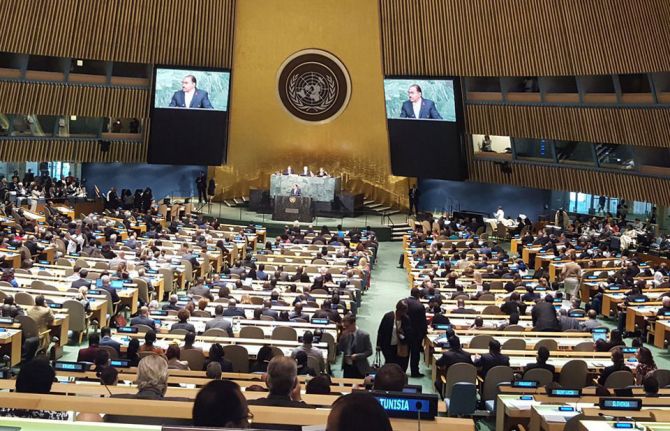
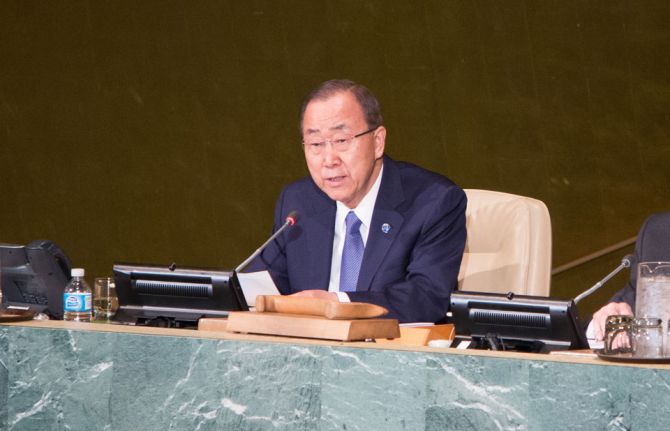
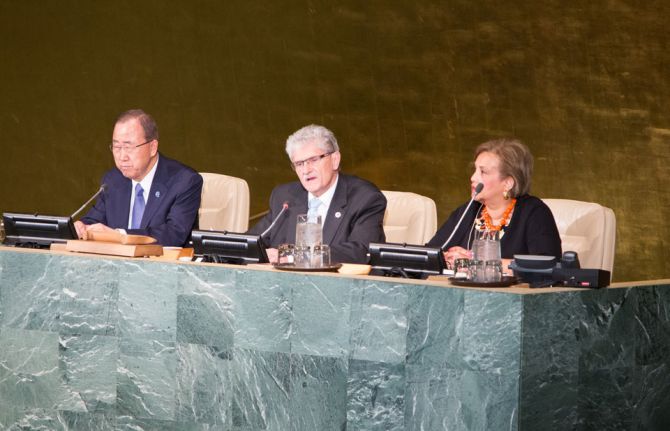
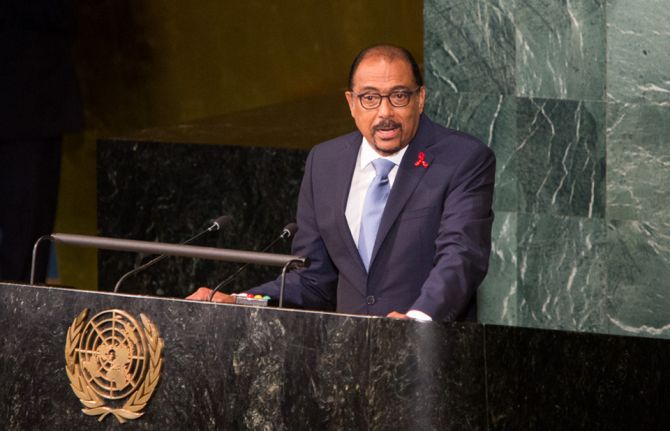

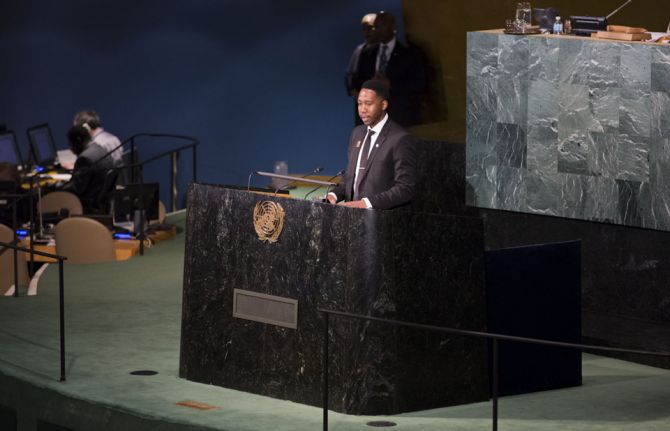
Press Release
Bold new Political Declaration on Ending AIDS adopted in New York
08 June 2016 08 June 2016United Nations Member States agree to reach ambitious new targets by 2020, pledging to leave no one behind and end the AIDS epidemic as a public health threat by 2030
UNITED NATIONS, NEW YORK, 8 June 2016—A progressive, new and actionable Political Declaration on Ending AIDS has today been adopted by Member States at the United Nations General Assembly High-Level Meeting on Ending AIDS, taking place in New York, United States of America. The Political Declaration includes a set of specific, time-bound targets that must be reached by 2020 to end the AIDS epidemic by 2030 within the framework of the Sustainable Development Goals.
Heads of State and Government, ministers, people living with HIV, representatives of civil society, international organizations, the private sector, scientists and researchers have gathered at the High-Level Meeting on Ending AIDS to build on the commitments made in the Political Declaration and to set the world on course to end the AIDS epidemic as a public health threat by 2030.
“The global community is united in its resolve to end the AIDS epidemic within the framework of the Sustainable Development Goals,” said the President of the United Nations General Assembly, Mogens Lykketoft. “This meeting is laying the groundwork for future progress in creating healthier outcomes for everybody affected by HIV and building stronger societies prepared for future challenges.”
“The world has an opportunity to end an epidemic that has defined public health for a generation,” said the Executive Director of UNAIDS, Michel Sidibé. “The decisions made here, including the commitment to zero new HIV infections, zero AIDS-related deaths and zero discrimination, will provide the springboard for the implementation of an innovative, evidence-informed and socially just agenda that will end the AIDS epidemic by 2030.”
Remarkable progress has been made in the response to HIV since the last United Nations General Assembly Meeting on HIV and AIDS, in 2011. By December 2015, 17 million people were accessing antiretroviral medicines and new HIV infections among children and AIDS-related deaths have been considerably reduced. There has also been progress in reducing tuberculosis deaths among people living with HIV.
However, the number of new HIV infections among adults has remained almost static since 2010 and too many people are being left behind in the response, including young women and girls and specific groups of people, including sex workers, prisoners, gay men and other men who have sex with men, transgender people and people who inject drugs.
The High-Level Meeting on Ending AIDS will focus attention on the importance of a Fast-Track approach to HIV over the next five years to set the world on course to end the AIDS epidemic. The UNAIDS Fast-Track approach to ending the AIDS epidemic has a set of time-bound targets, including reducing the number of people newly infected with HIV from 2.1 million [1.8 million–2.4 million] in 2015 to fewer than 500 000 in 2020, reducing the number of people dying from AIDS-related illnesses from 1.1 million [940 000–1.3 million] in 2015 to fewer than 500 000 in 2020 and eliminating HIV-related discrimination.
The participants will take part in a series of discussions and events throughout the High-Level Meeting on Ending AIDS to discuss how to transform the Political Declaration into concerted action through scientific innovation, financial sustainability, ending stigma and discrimination and creating socially just, resilient and inclusive societies that leave no one behind.
There will be a series of panel discussions and side events, including on leveraging the end of AIDS for social transformation and sustainable development, financing and sustaining the end of AIDS and stopping new HIV infections. UNAIDS will launch a report on the remarkable progress made in stopping new HIV infections among children. UNAIDS has also announced, together with the World Health Organization and partners, that a further three countries—including Thailand, which at the peak of the epidemic had more than 3000 new infections among children per year—have eliminated new HIV infections among children.
Other events include a youth pre-meeting and an interfaith service. The High-Level Meeting on Ending AIDS will also include an innovations marketplace that will showcase new technologies and tools in the area of health and HIV. On Monday, 6 June, the Mayor of New York, Bill de Blasio, hosted an event on Fast-Track cities at the New York City Public Library that underscored the key role that cities are playing in ending the AIDS epidemic.
The United Nations General Assembly Meeting on Ending AIDS is convened by the President of the United Nations General Assembly and co-facilitated by Switzerland and Zambia.
UNAIDS
The Joint United Nations Programme on HIV/AIDS (UNAIDS) leads and inspires the world to achieve its shared vision of zero new HIV infections, zero discrimination and zero AIDS-related deaths. UNAIDS unites the efforts of 11 UN organizations—UNHCR, UNICEF, WFP, UNDP, UNFPA, UNODC, UN Women, ILO, UNESCO, WHO and the World Bank—and works closely with global and national partners towards ending the AIDS epidemic by 2030 as part of the Sustainable Development Goals. Learn more at unaids.org and connect with us on Facebook, Twitter, Instagram and YouTube.
Contact
Office of the President of the General AssemblyUlla Oestergaard
tel. +1 646 388 3080
oestergaard@un.org
UNAIDS
Sophie Barton-Knott
tel. +41 79 514 6896
bartonknotts@unaids.org
UNAIDS
Michael Hollingdale
tel. +41 79 500 2119
hollingdalem@unaids.org
UN Department of Public Information
Francyne Harrigan
tel. +1 917 367 5414
harriganf@un.org
Press centre
Download the printable version (PDF)
